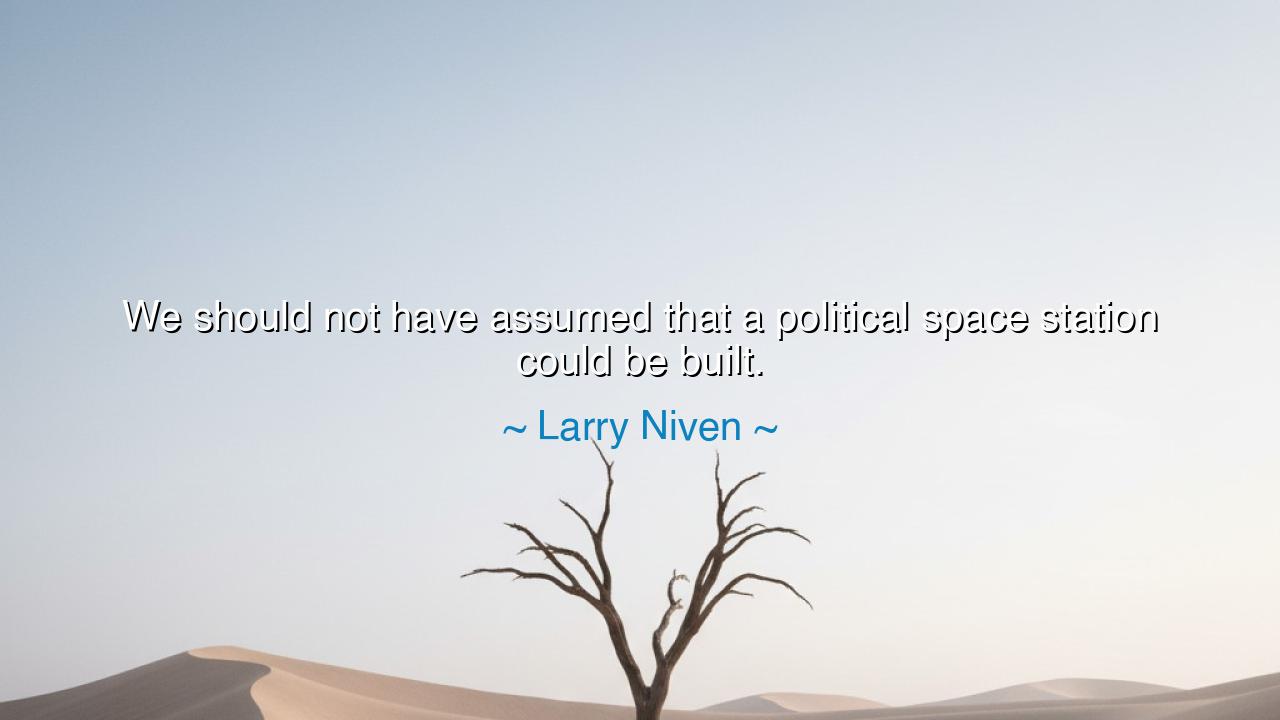
We should not have assumed that a political space station could






Hear the solemn words of Larry Niven, the dreamer of worlds and builder of imagined realms: “We should not have assumed that a political space station could be built.” In this statement lies a warning not only about the stars above, but about the frailty of human ambition when burdened by the weight of politics. For he speaks of the clash between vision and power, between the purity of exploration and the corruption of rivalry, between the dream of the heavens and the entanglements of the earth.
The origin of this saying lies in the speculative visions of Niven, a writer of science fiction who sought to glimpse the future of humanity among the stars. He looked at the dream of a space station, not as a neutral vessel of discovery, but as a creation entangled in the competing wills of nations and factions. To build such a station politically—bound by compromises, rivalries, and the selfish grasp of power—was to court failure. His warning reflects a truth seen in history: that when lofty endeavors are yoked too tightly to the machinery of politics, their greatness is diminished, their unity broken.
Consider, O listener, the tale of the Tower of Babel. Humanity once sought to build a structure that touched the heavens, but their pride and division shattered the work. Though their failure was clothed in myth, the lesson remains: unity of purpose cannot long survive when burdened by discord. So too with Niven’s political space station—what should have been a monument to exploration became a symbol of strife. Where trust is absent, even the grandest construction collapses under its own weight.
History offers another parable in the International Space Station itself. Though it was built, it was not without immense struggle—years of delay, disputes over funding, conflicts between nations. Even now, its fragile cooperation trembles under political storms on Earth. It shows that science and discovery thrive best when freed from the chains of power struggles, when guided not by the agendas of rulers but by the shared vision of humankind. Niven’s warning is not that such a station is impossible, but that building it upon political foundations alone is folly.
The meaning of his words stretches beyond the stars. For in every sphere of life, we are tempted to believe that politics—compromise, rivalry, manipulation—can construct lasting greatness. Yet greatness rests upon sturdier stones: trust, shared vision, and devotion to something higher than self. Without these, institutions rot, projects falter, and bridges collapse. What is true of a space station is true of nations, families, and communities. No construction endures if it is built upon discord rather than unity.
Let this teaching, then, be passed down: if you would build something noble, do not assume politics alone will suffice. Look instead to principles that outlast ambition—justice, cooperation, humility, and truth. Seek allies not only in convenience, but in shared conviction. A political space station may fail, but a station built upon trust may stand for centuries. So too with your own works—if they rest upon shallow bargains, they will crumble, but if upon truth, they shall endure.
And what actions must we take from this wisdom? In your life, do not build relationships or works upon calculation alone. Let your foundations be sincerity and mutual respect. In your community, do not assume compromise without conviction will bring peace; seek instead true unity of purpose. And in the world beyond, remember Niven’s warning: technology may carry us to the stars, but only character will allow us to dwell there. The future cannot be built upon politics alone—it must be built upon the higher virtues that bind humanity as one.






AAdministratorAdministrator
Welcome, honored guests. Please leave a comment, we will respond soon